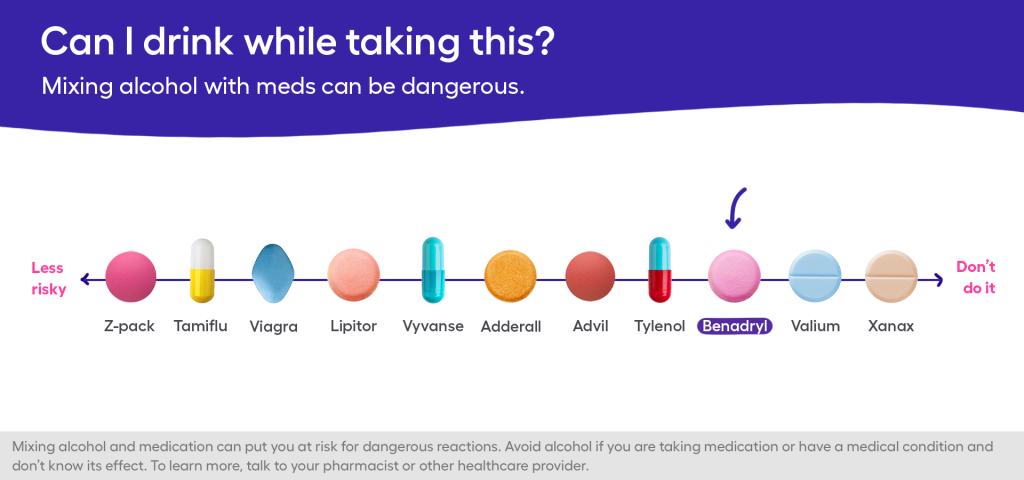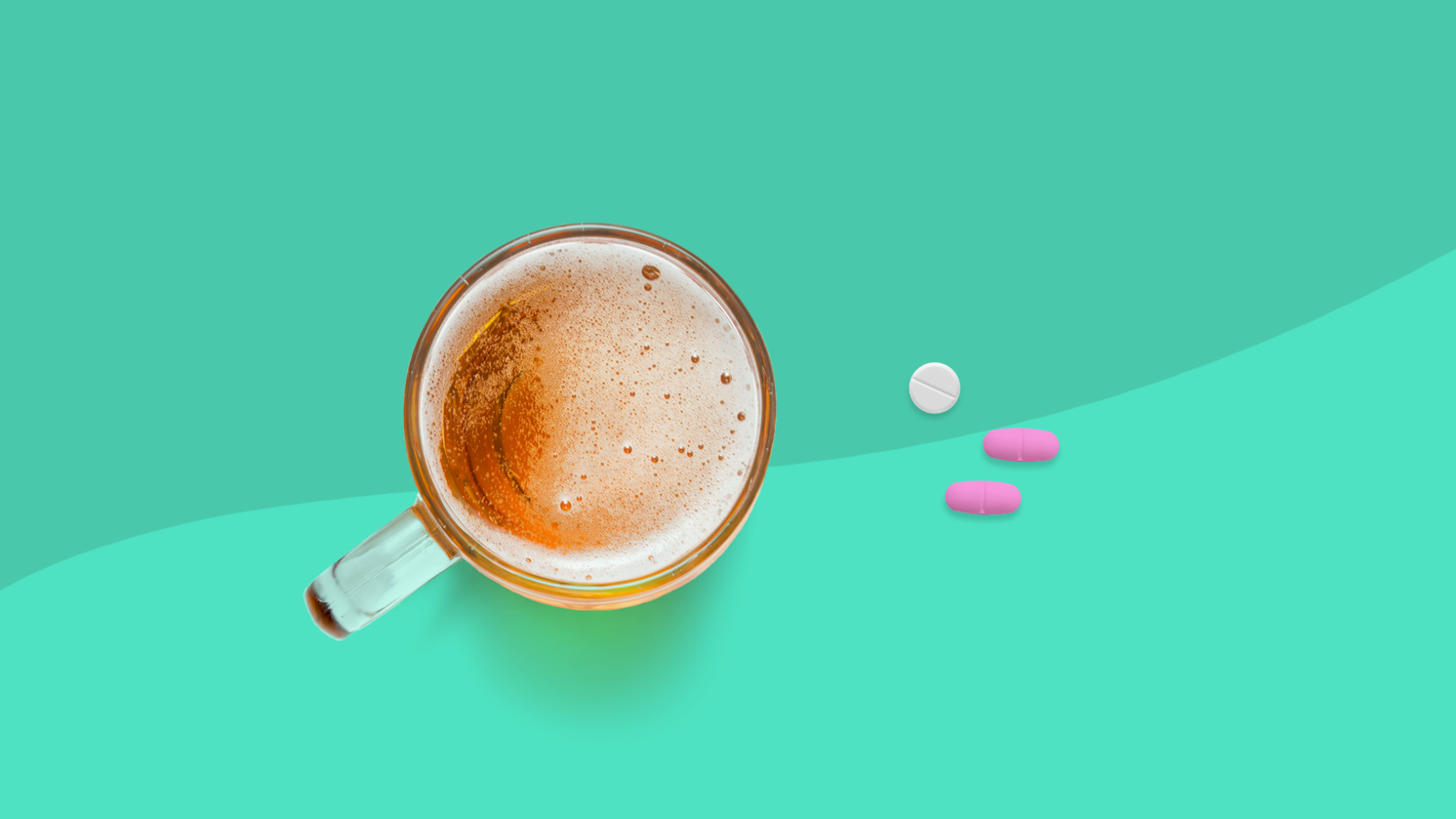Key takeaways
First-generation allergy medicines like Benadryl should never be mixed with alcohol due to the increased risk of severe drowsiness and the potential for harmful interactions.
Second-generation allergy medications, such as Claritin, Allegra, or Zyrtec, are considered safer with alcohol because the risk of sedation is lower.
In severe allergic reactions, taking a first-generation antihistamine like Benadryl is necessary and immediate medical attention should be sought.
Nasal sprays like Flonase or Nasonex are recommended alternatives for those wishing to consume alcohol, as they don’t typically cause drowsiness or interact negatively.
Seasonal allergies are as common as they are annoying. According to the Asthma and Allergy Foundation of America, allergic rhinitis (aka hay fever) affects 20 million adults in the United States each year. And millions more experience various other types of allergies—everything from insect bites and pet dander to shellfish, peanuts, and mold spores (to name a few). If your allergy is severe enough, you might carry an EpiPen or receive allergy shots. For most people, however, over-the-counter allergy medicine is the first line of defense against allergy symptoms.
But how does taking allergy medication impact your ability to enjoy those #weekendvibes? In other words, will you still have the option to enjoy a cold beer on a hot summer night (or a hot toddy on a cold winter night) if you are taking something to combat your itchy eyes, runny nose, sneezing, hives, rash, or scratchy throat?
Can you drink while taking allergy medication?
If you’re taking medication to manage your allergies, you may wonder if it’s safe to drink alcohol—and for good reason. Combining allergy meds with alcohol can cause side effects that impair your daily functioning and pose health risks. Keep reading to uncover the relationship and risks between alcohol and first- and second-generation allergy medications.
First-generation allergy medicines
If your allergy med of choice is diphenhydramine, also known as Benadryl, the answer is an emphatic NO. Diphenhydramine and alcohol should never, EVER, be combined, says David Corry, MD, a pulmonologist and professor of medicine in the immunology, allergy, and rheumatology department at Baylor College of Medicine in Houston, Texas. The same rule applies to other first-generation allergy medications such as Chlor-Trimeton (chlorpheniramine), Tavist (clemastine), and Atarax (hydroxyzine).
“That is a big contraindication,” Dr. Corry says. Why? The primary side effect of these medications, which are central nervous system depressants, is drowsiness (case in point: Benadryl is also used to treat insomnia), which is also one of the primary side effects of alcohol consumption.
“First-generation antihistamines (like diphenhydramine, chlorpheniramine, clemastine, and hydroxyzine) will cause drowsiness in just about everybody, and alcohol does that too,” Dr. Corry explains. “So if you are taking alcohol and antihistamines, your chances of having a double dose of that drowsiness are very, very high.”
In the worst-case scenario, he explains, this double dose of drowsiness can not only impair your ability to function and increase the likelihood of some sort of accident, but it can also lead to difficulty breathing and unconsciousness. Meaning, that cocktail is not worth the risk.

The only exception to this hard-and-fast rule is if someone has a severe allergic reaction to something, like food or an insect bite, in the midst of alcohol consumption.
“If you are allergic to shellfish and you had two martinis and then somebody passes you a shrimp and you are having a reaction … you would not withhold Benadryl,” says Maria Marzella Mantione, Pharm.D., director of the Doctor of Pharmacy program at St. John’s University in Queens, New York. She adds that in this scenario, the patient needs professional medical care, so call 911 or get them to a healthcare provider immediately.
“These concerns (about antihistamines and drowsiness) are really outside of this particular context of severe, life-threatening situations,” Dr. Corry agrees.
Fortunately, Benadryl clears from your system in four to six hours, says Dr. Mantione. So, presuming the allergic reaction is kept at bay, you won’t be teetotaling indefinitely.
Second-generation allergy medicines
If you have chronic seasonal allergies, it is unlikely your healthcare provider will recommend a first-generation antihistamine, says Dr. Mantione, because these are normally used for acute reactions. Instead, she explains, you’ll likely be steered toward one of the second-generation allergy medications. Claritin (loratadine), Allegra (fexofenadine), Xyzal (levocetirizine), or Zyrtec (cetirizine), and alcohol are generally considered a slightly safer combination. These medications do not typically cause drowsiness or other side effects that are intensified by alcohol consumption.
“Most of these have a reduced, if not completely absent, side effect of sleepiness,” Dr. Corry says. This is not to say, however, that it is okay to go on a bender while taking Claritin, Zyrtec, Xyzal, or Allegra—Dr. Corry recommends avoiding alcohol use altogether while taking any medication.
But is doing so going to lead to a critical medical emergency? Probably not, explains Dr. Mantione. “It is one of those situations where, as a pharmacist, I say it is best to avoid because we don’t know how it is going to affect you, but it is not (considered) a life-threatening combination,” she says.
She also offers an alternative treatment option for those who don’t want to give up the opportunity to have a drink—nasal corticosteroids, such as Flonase or Nasonex. These are used as needed and are safe to use regularly throughout the allergy season. They don’t have a contraindication with alcohol, and they don’t cause drowsiness or other systemic side effects, she says.
“If somebody came to me and said, ‘I am on this allergy medication, but I am going away on vacation, and I am hoping to have Bahama Mamas every day,’ I would recommend the nasal corticosteroid,” Dr. Mantione says.
Is having one or two drinks okay?
It’s crucial to be cautious when combining alcohol with allergy medications—even that glass of wine with dinner. Alcohol should be avoided completely with first-generation antihistamines like diphenhydramine due to the increased risk of drowsiness and impairment. Although second-generation antihistamines are generally considered safer, healthcare professionals advise against drinking on any allergy medications, except nasal sprays.
Are certain people at greater risk of side effects?
Yes. Older adults, individuals with certain medical conditions, and those with heightened sensitivity to either substance may be at a higher risk of adverse effects from mixing alcohol with allergy medications. Additionally, people taking multiple drugs or with a history of alcohol abuse should be particularly cautious.
How long after taking allergy medicine can you drink alcohol?
When you take your allergy medication is important, too. For first-generation antihistamines like Benadryl, it is recommended to wait at least four to six hours after the last dose before consuming alcohol, which is typically how long it takes the medication to clear from your system. For second-generation antihistamines, consult with a healthcare professional to determine the safest approach regarding alcoholic beverages.
The bottom line
Combining alcohol with medicines for allergies should be avoided. First-generation antihistamines pose significant risks when paired with alcohol, while second-generation options are generally safer but still warrant caution. Ultimately, it is best to err on the side of caution and avoid alcohol while taking any allergy medication to ensure optimal health and safety. Always consult with a healthcare provider for personalized medical advice.
- Allergy facts and figures, Asthma & Allergy Foundation of America




